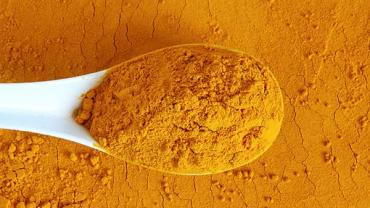
Curcumin is a plant-derived polyphenolic compound, found in the dried rhizomes of turmeric (Curcuma longa). It has been the focus of much investigation in recent years and found to possess numerous pharmacological activities because of its ability to modulate various biochemical pathways that are involved in the pathogenesis of many chronic diseases.
Although curcumin possesses exciting therapeutic potential, it has also presented a sizable enigma – namely, its poor systemic bioavailability due to its highly lipophilic nature. However, this problem doesn’t limit its ability to support the gastrointestinal (GI) tract, making it a valuable tool for addressing the health of a foundational organ system. It actually functions best in an acidic pH, making the GI tract an ideal location for it to work.
According to an animal study published in 2017 in Food and Nutrition Research, curcumin is able to alter the intestinal microbiota in ways that positively impact outcomes on various metabolic conditions such as obesity, diabetes, and chronic liver disease. By modulating the microbiome which is linked to numerous systemic pathways, bioavailability alone does not have to be the obstacle for harnessing curcumin’s therapeutic potential.
In a rat study where curcumin was administered orally for 15 days, followed by a fecal analysis to evaluate the richness and diversity of the gut microbiota, animals given curcumin showed changes in the abundance of Prevotellaceae, Bacteroidaceae, and Rikenellaceae families. In a similar study, 16S rDNA sequencing was used to explore changes in the microbiota in rats who had been ovariectomized or given a sham procedure. Removing the ovaries decreases estrogen, resulting in a changed microbiota. Rats who were ovariectomized were given curcumin or a control vehicle for 12 weeks. Results showed that the ovariectomized rats given curcumin displayed greater diversity and a healthier Firmicutes/Bacteroidetes ratio that was more similar to rats in the sham group, showing that curcumin may be helpful in reversing the microbiota changes induced by hormonal shifts.
Helicobacter pylori (H. pylori) infections are another common cause of GI conditions, but several in vitro, early cell culture, animal research and pre-clinical trials suggest that curcumin may be a helpful agent in fighting H. pylori mediated gastric conditions and carcinogenesis. It has shown antimicrobial effects against microbes including H. pylori by stabilizing cell membranes, preventing the active phagosomal escape of cytosolic pathogens, and enhancing the active inhibition of lysosomal fusion by vacuolar pathogens.
Curcumin has also been studied for its potential anti-cancer properties, which may make it a good adjunct to conventional cancer therapy. Poor bioavailability and a robust first-pass metabolism have made it difficult to achieve systemic levels of curcumin in human studies, which would lead to therapeutic potential for cancers beyond those rooted in the gastrointestinal tract; however, newer formulations that address these issues are being researched, keeping curcumin in the lineup for adjunct cancer support. According to a review published in 2017, combining curcumin with antineoplastic drugs has resulted in enhanced outcomes with minimized side effects. In in vitro studies, where bioavailability was not a problem, curcumin inhibited important transcription factors and thereby decreases production of pro-inflammatory cytokines which leads to reduced inflammation and cell survival. Animal models of oral, esophageal, stomach, duodenal and colon cancer have shown curcumin to exert positive outcomes suggesting it to be a promising adjunctive to conventional therapy.
Curcumin’s potential usefulness in GI conditions and as a chemopreventative can also be more broadly associated with its antioxidant and anti-inflammatory properties. It is a strong free radical scavenger and counteracts the actions of reactive oxygen and nitrogen species, protecting against oxidative damage – a root pathology in many GI conditions and carcinogenesis. It’s antioxidant effects certainly work to decrease inflammation, but it also acts directly upon inflammatory pathways by inhibiting nitric oxide synthase (iNOS), cycloxygenase-2 (COX-2), and the production of production of pro-inflammatory cytokines [IL-1, IL-6, IL-8, IL-12, interferon γ (IFN-γ), tumor necrosis factor-α (TNF-α) etc.], monocyte chemoattractant protein (MCP), and migration inhibitory protein (MIP).
The health benefits of curcumin have potential to reach far and wide, targeting some of our most concerning health conditions, as technological advancements continue to work to overcome the challenges of bioavailability. In the meantime, this golden botanical can exert its value upon the GI tract where it can modulate the microbiota, and fight against oxidation and inflammation, and improve the health of the most foundational organ system.